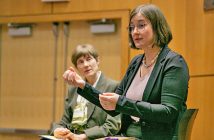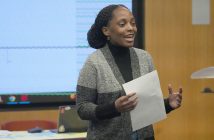Despite a past plagued by scandal and a waning presence in Irish life, the Catholic Church is poised for a rebirth, according to several prominent thinkers from the Emerald Isle. On March 10, a philosopher, psychiatrist, historian and theologian met at Fordham’s Lincoln Center campus for a frank, all-day discussion of “The Church in Present-Day Ireland,” presented by the University’s Institute for Irish Studies. John P. McCarthy, Ph.D., professor of history and director of the Institute for Irish Studies, said he conceived the idea for the conference after several recent trips to Ireland, where he noticed increasing hostility toward the church. “At the institute we concern ourselves primarily with Irish religious heritage, so of course we would find this troubling,” he said. “There’s kind of a stock image people have of things in Ireland – a kind of rosy image – and I don’t think it’s valid.”
The picture conference participants painted of a church in crisis was sometimes brutal in its candor. Dermot Keogh, Ph.D., a historian from University College Cork, for example, said the poor implementation of Vatican II, an unyielding authoritarianism and the relegation of women to positions of non-importance had contributed to current disaffection. “If you have the female equivalent of Michael Jordan on the bench and you keep her there, that really is not in keeping with the times,” he said. The Rev. Vincent Twomey, S.V.D., editor of the Irish Theological Quarterly and a lecturer on moral theology at the Pontifical University, Maynooth, decried the fact that the church had let Christianity become synonymous with Puritanism. “Puritanism produces hypocrisy and that produces a reaction, and that’s what’s going on today,” he said. “In a certain sense we are suffering from amnesia. We can’t remember our past. We don’t even have a Cathedral in Dublin.
All that’s left now are ruins visited by German students and tourists.” Among the audience of more than 100 alumni, faculty and Irish Institute supporters, there were murmurs of surprise – and even a few quiet groans – at statements like this, but certainly no lack of interest. The group sat riveted until Rev. Twomey’s very last word, an hour and 20 minutes past the advertised end time. The Rev. Seamus Murphy, S.J., a philosopher from the Milltown Institute of Theology and Philosophy, Dublin, pointed to Ireland’s soaring population of children born to unwed mothers – from 5 percent in 1981 to some 30 percent today – as one of many reasons for a slowly growing awareness that “Irish society still wants cultural conscience.”
Patricia Casey, M.D., a psychiatrist from University College Dublin Casey, said applicants to the priesthood are now older, wiser, more experienced and better educated than their predecessors. “Young people are listening to what the religious life has to offer,” she said, adding that a recent study of 1,000 Irish citizens found that people born after 1970 felt much closer to the church than their elders. “Yes, there are problems,” she said. “However, there are straws in the wind of a recovery taking place.”


